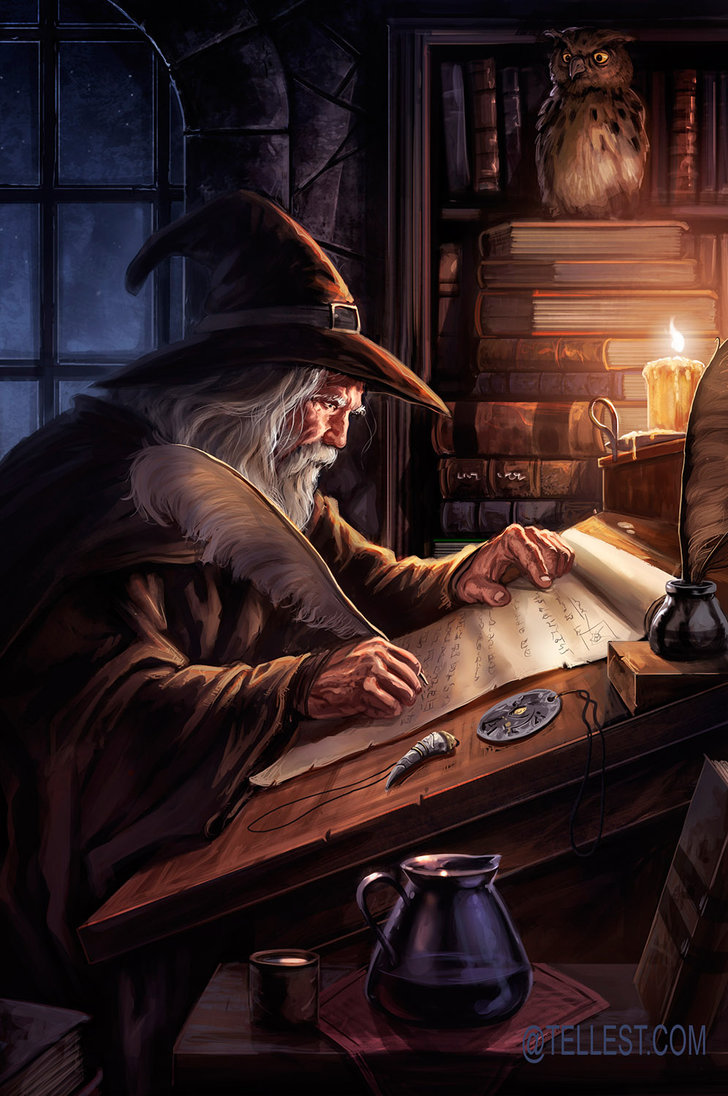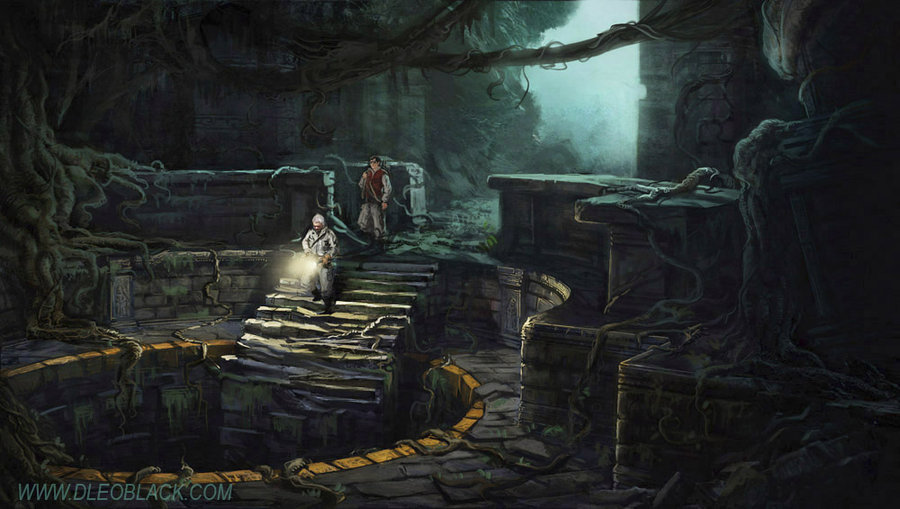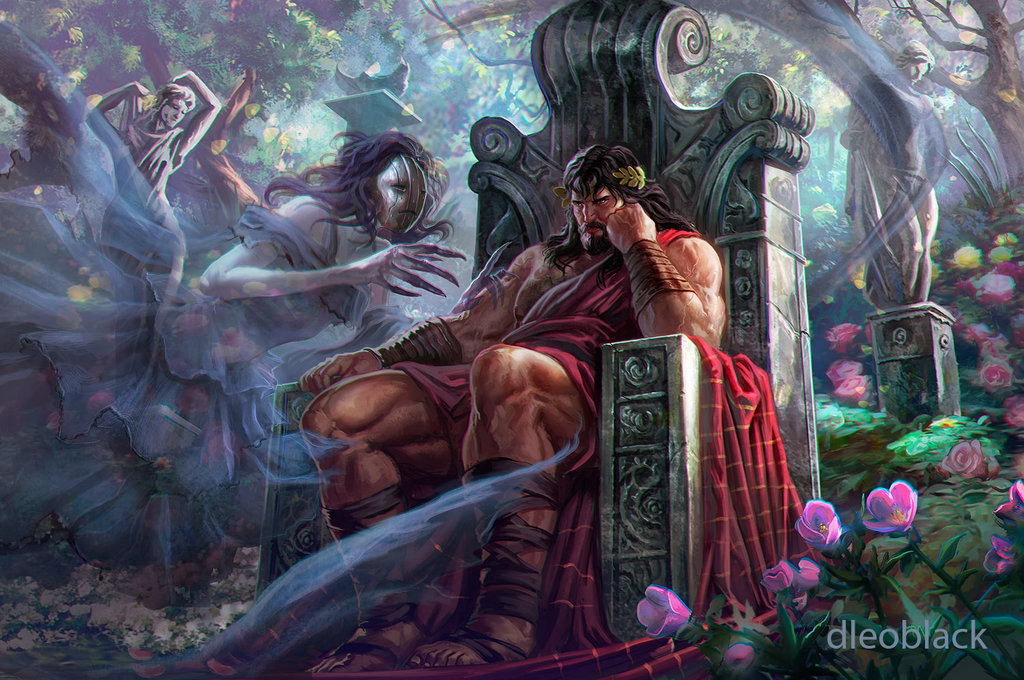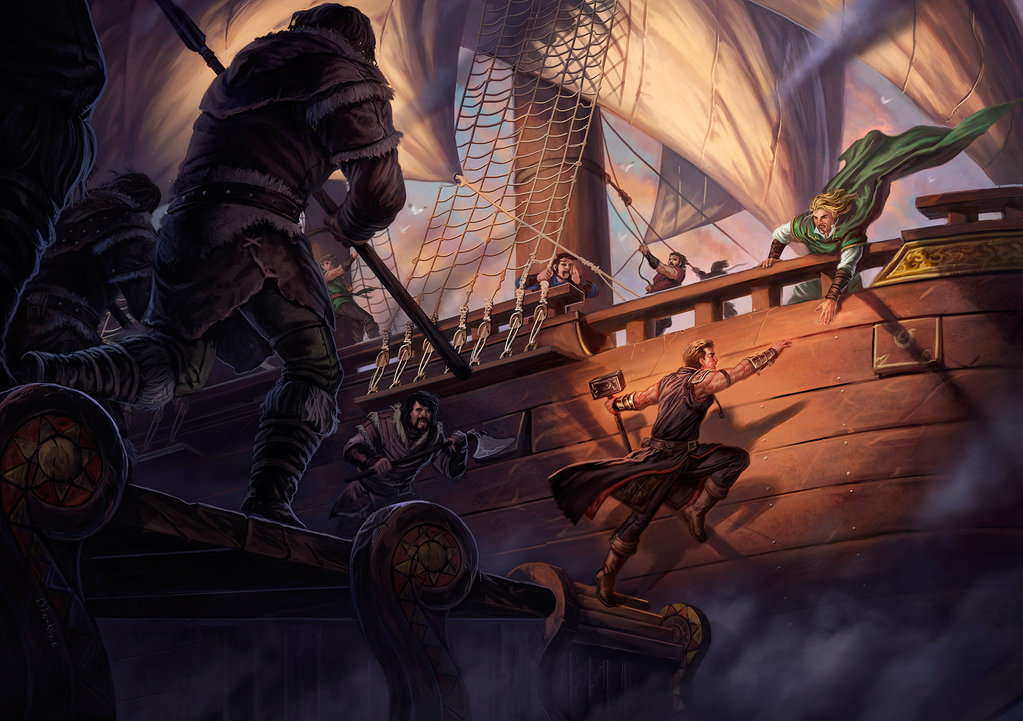Metagaming, lone-wolf characters who never get involved, min-max characters, broken spell combinations, pocket sand, tucker’s kobolds, player hand-offs: All of these annoying and ceaselessly discussed topics stem from a single point – a patient zero of all problematic TTRPG roleplay: when players are trying to “beat the game” you’re playing.
Let’s talk about why this is a problem and how to fix it!
Art By: Leonardo Borazio
Foreword: This may be my longest article ever. It seeks to help rationalize and give examples of how Playing a Tabletop RPG is different from Role Playing a character. If that sounds confusing: trust me, it is. But if you stick it out to the end, this article might change your perception on Tabletop Gaming.
Understanding The ‘Game’ Aspect
There is a fundamental difference between Role Playing and a Role Playing Game. It seems silly to discuss this, but it really is a big deal.
In a Role Play, there is no ‘Win Condition.’ There’s no ultimate goal that the characters are hell bent on accomplishing and no predetermined ‘end’ to the scenario.
Ganren Felk, a fifty year old cobbler, struggles to care for his ill son and keep the family business open and the roof over their heads. His eye sight is failing, and his hearing was never much to begin with. But when two young entertainers come into town, Ganren risks being whisked away by their flights of fancy and doting natures. Ganren is torn between the fleeting feeling of being a young man again and the life his dead wife and daughter has left for him.
Ganren has no win condition – he merely exists in a state of turmoil in which he’s pulled in two different directions. The drive is to “find out what’s next” for Ganren. Will he fall in love with the entertainer half his age and twice his status? Will he finally earn enough money to cure his son’s ailment? Existing in that state of ever shifting narrative means that, until the plot becomes tiresome or boring, it can continue on without a conclusion.
A Role Playing Game, on the other hand, generally has a set framework. A starting point, and ending point, and various obstacles in between for the present players to overcome using their characters – their avatars within the world. A Role Playing Game requires an additional level of commitment from a player: the willingness to play the game. Let me explain:
Fanren Gelk, a fifty year old stone mason, struggles to care for his ill son and keep the family business open and the roof over their heads. His eye sight is failing, and his hearing was never much to begin with. When two young entertainers come into town, Fanren struggles not to be whisked away by their flights of fancy.
The female entertainer, Mary Shepard, asks Fanren to come with them in the morning to see their show in a neighboring town. Fanren, unable to leave his son, refuses. The duo then pay for a nurse to care for the boy until they return. Unable to close the business for that long, Fanren, crestfallen, tells the performers he cannot leave. The actors, again, pay Fanren for his time and promise to have him back in a timely fashion, going so far as to inform the local doctor that upon his return, Fanren is to be given whatever medicine he requires for his son’s long-term care – paid in full. He reluctantly agrees.
The game continues, but do you see what happened there? Tell me, dear reader… what part of Fanren’s backstory now matters at all until he returns home? He’s being paid, his son is being cared for – so long as he doesn’t get killed on the trip, he’s basically content. What happens on the trip is less important than what it changes when he returns.
Where Ganren’s story is his struggle between the coaxing of these entertainers trying to befriend him and his dying son, Fanren’s goal, the object of the game for Fanren, is To Return Home. Please, remember this!

Where Plots and Players Clash
There is an unspoken but all-important rule that all players must follow. They’re here to play the game. If you’re unsure what I mean by that, check out my previous writings on the Un-Game for a primer. There are two parts to playing the game: Role play and Story Creation.
Role Play can be hard for some, but ultimately it boils down to: What would my character do (or perhaps) What would I do in that situation, if I were my character?
Story Creation is hard for everyone – forever. It’s the white rabbit we chase down this endless rabbit hole: How can I make this story better? Every single step of the journey and the game runs, head long and frantically, toward answering that question. So, what happens when both are put in the hands of a player?
Generally speaking, there has to be a balance between what the character would do, what the player wants, and what the game needs. Of those reactions, let’s see which one plays into the game the most:
On the old road to Birch, the entertainers – Mary and Jacques – awe Fanren with tales of their travels and the sights they have seen. Jacques liberally passes a wine skin back and forth between you, and Mary seems smitten with your company. That night, Mary drinks a little too heavily, begins to seductively open her blouse, and passes out in the floor of your tent.
The director of the play, hearing the rattle and clank of Mary hitting the tent post, holds open the flap and his eyes go wide. The star of his play, the young and beautiful centerpiece, lying partially naked, passed out on the floor of some common man’s dwelling. Fearing for his play’s future – he rips a coin purse from his belt and tosses it at Fanren’s feet: “Leave this company at once!” he says in a practiced whisper. “Just leave her there and get you gone!“
Oh boy, this does looks pretty untoward, doesn’t it? So… Let’s talk about the elephant in the room here: Fanren.
Fanren is a perfectly fine protagonist. From a game stand-point, where Mary and Jacques are also CENTRAL to the plot and scope of the game – he’s an anchor being carried without some internal force driving him. If Fanren’s player is attempting to “win” in this instance. Fanren’s game is over… here’s why.
What the Game Needs: Fanren has to find a way to stay with the company and prove to the director that all is not what it seems.
Fanren tosses the coin purse back to the Director and says “I’m no lecher, sir. I may be common, but I’m not a beast.” The director, shocked by such a display, watches on as Fanren gingerly covers Mary with a blanket and departs the tent to find somewhere else to sleep.
What the Character Wants: Fanren truly does love his son – and the sooner he gets home, the sooner the physician will procure medicine for him. With this money, he’d be better off than if he had stayed and worked twice as much.
Fanren grabs the purse, pulls his pack onto his shoulder, and without another word to the director, leaves. “I’m coming, son.”
What the Player Wants: Here’s the big one! Does the player want the STORY to continue, or do they want Fanren to get what he wants? There are thousands upon thousands of reasons for either decision. No one would fault the player for either choice – certainly… but only one of them keeps Fanren in the game. A player trying to “win” at this game might do the following:
Fanren grabs his pack, grabs the coin purse, and runs all the way back home. Once he’s there, he gets the physician to make the medicine, he pays the doctor, and pays the nurse to watch over his son longer, Then, he gets a carriage to take him non-stop all the way to Birch, where he meets back up with the Company and apologizes.
Is it plausible? Yes. Does it solve a lot of problems? Sure. In this instance, the player has found a way for Fanren to get everything he wanted… right? So why does it seem so dull?
The player wasn’t playing the game. The player was trying to beat the game.
A Different Perspective
Let’s take roleplay out of the equation. Let’s say you sit down with four friends to a board game. This board game is about an ancient evil that awakens in downtown Detroit. It’s what’s spurred the violence and decay within the city for years! Now it lumbers between the abandoned buildings and lurks in the shadows, living within victims until it can strike again! Only a crack team of detectives can track it down – all starting with a corpse found inside a slab of concrete that had to have been poured over sixty years ago!

You open the box, sit down, and each player is given a card that says “Place this card face down. You may choose to turn this card face up at any time, and when you do – the investigators win the game, destroying the monster.”
Do you immediately flip the card over?
If you do, you’d be considered an ass – “Why do we even bother playing?” So… why? Chances are, playing the game means more than the outcome. After all, you don’t win anything for beating a board game. The fun comes from playing it.
Playing a Tabletop RPG should always always feel like that. Even if there is an end goal, a “victory condition” – the real game is not about getting there, it’s about how the game got there.
In the scope of the game, Fanren’s son doesn’t matter AT ALL. The game is about traveling to Birch and performing a play. The game is seeing Fanren change, somehow, along the road. Does he start picking pockets to earn extra money – seeing this rich folk don’t need it? Maybe he makes himself invaluable to the company and they offer him full-time work once his son is better. What if he falls in love with Mary or Jacques?
THAT’S THE GAME, my friends.
The Character Conundrum
You’re playing a game like Dungeons and Dragons. You say to me “But Mr. TheDie, my character doesn’t want to be eaten by monsters!”
Your character should change. Dungeons and Dragons is the most egregious example of everything we’ve discussed. You get stabbed, blown up, pelted with rocks, stabbed in the back (literally and figuratively), and face untold horrors straight from the pit of the Nine Hells all so you can pay for your mother’s gambling addiction… The thought of “Should I just retire?” comes up every ten seconds. Why face the Archangel being controlled by an immortal being of shadow and hate when you could… let other people handle it? Go, Elminster! Fix this!
You agreed to play the game.
The game is seeing heroes pit themselves against these monsters and insane odds and come out on top (or die, who knows). That’s the game you agreed to play, that’s the game you should be playing.
If your character wants to settle down and live a safe life, then retire them and make a new character who wants to purchase the castle of the duke who spat on him when he was a stable hand. Make a character thirsty for adventure and loot and fighting. Because that’s about half of the game.
There are moments for quiet reflection, but unlike general roleplay, your character cannot survive inside a vacuum. You’re either moving along with the plot, or that character no longer exists until they matter to the plot.
The Big Question
“Is this the story I want to tell?”
If given an out, an instance in which you can bypass or completely undercut the plot/story of a game – ask yourself if that’s the story you want to tell. Do you want the adventures of Butilius, the Bold to end with him buying all the oil his ships can carry to burn down an island paradise because it’s infested with ghosts?
By comparison, if you want to do something amazing and give yourself an advantage within the story, it might be just fine! Realize there are other players present who might hate it, but maybe what the story needs is for Butilius to seduce the long-dead ghost of the princess of Sunlight Isle, who helps your party convince that making you the king of that long-abandoned ghost ridden paradise will put them to rest… or maybe it doesn’t.

Final Thoughts
Art By: Leonardo Borazio
In a general roleplay, your character might be chatting with some tart at the local Tavern, and the next role player shift the scene back to them punching a Nazi on board a zeppelin, careening into the ocean. This works because each character, in essence, is their own chapter in a novel.
In a Tabletop RPG, the characters are devices to help manipulate, shift, and shape the arch and plot of a story: they are hammers players use to bang the damn thing into a good shape. There has to be a sense of community and cohesion between the characters: the wheels have to be going the same direction for things to proceed. If you spend your time trying to find ways to manipulate or break the game to “win” – you may as well not even bother sitting down.
Note to DMs out there:
If your players frequently try to break the plot and ‘win’ your game – you may be playing the wrong game or with the wrong people. If you sit down to run a game where your players are supposed to stop whoever is spreading a plague through the city, and they constantly try to manufacture ways to cure the plague or kill everyone in the city or burn down a whole district instead, you don’t have to make up reasons it doesn’t work: (the plague evolves, the plague mutates, whoever is spreading it seems to change the formula of whatever they’re using to cause it).
You might have to admit to you’re running the wrong game – or running the right game for the wrong people.

I don’t always advocate rolling, but when I do… be sure you have to Drop the Die.
Review by JB Little, Follow me on twitter for more “useful” information.

This is so well written. Thank you.
.
More players, especially new gamers are in that very Need to Win frame of mind. Maybe it’s that Console Game mentality. You play you win. Any wrong action you reload and start again.
Newer players want to break the game as it goes ( some older, ok a lot of gamers) .
The City watch stops and asked you your business.
Player. ” I attack him!
What….why?
And so it goes. Trying to teach the player to be a better player though down to the GM who is teaching it is also down to the player to learn. Learn good!.
Saying that.
Getting to play once a blue moon means they just want to relax. Kill something, anything. Kill it till it’s dead then kill it some more.
Those play better in one shot games.
Anyway I digress and get carried away.
Great article